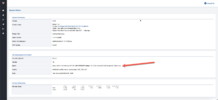Really hesitant to post here about this, since there are a lot out there that make this seem like it "just works".
I have tried multiple times, and have never yet managed to get it to work. I always get errors when running the installer script. Then i usually get the Nginx 404 error (from memory this was an issue around what php version is installed/dimensioned, be it 7.2/7.4 etc). And if i get past this it continues to error out. After a few hours I just give up.. and then ironically try again a few weeks later...
I am running a Pi4 with 4Gb memory, running off a 128Gb M2 SSD. This is the second of these i have tried just to rule out a dodgy PI. Sd cards i use to initially install this onto the machine has changed a few times also, all well known brands (Kingston/Sandisk genuine and even a couple of lesser known cards that whilst not massivent popular have proved themselves over the last couple of years).
So - Has anyone specific particulars about which Os to use (Bookworm? Bullseye etc). Is there anything that needs to be done before/after installation to make it work? Anyone have a step-by-step "go here, d/l this, enter this command, enter this, and finally it comes back and "just works"".
I have tried most of the methods on here, and get the same issues - hence why i'm currently at my witts end, and why i'm asking - no, begging - for suggestions etc as to how others have got it to work! Theres only so many hours one can stare at a screen before screaming at it.
If people could share their process, then hopefully we can identify one that, in 2025, actually works!
(and before anyone puts "use the official installer" - i cant get that to work either.
I wish there was just an official default "pi" image that could be released - only because that way i could be sure that it should just work
Thanks for any advice, hopefully saving me before I do give up finally and throw it out of the window.
Paul
I have tried multiple times, and have never yet managed to get it to work. I always get errors when running the installer script. Then i usually get the Nginx 404 error (from memory this was an issue around what php version is installed/dimensioned, be it 7.2/7.4 etc). And if i get past this it continues to error out. After a few hours I just give up.. and then ironically try again a few weeks later...
I am running a Pi4 with 4Gb memory, running off a 128Gb M2 SSD. This is the second of these i have tried just to rule out a dodgy PI. Sd cards i use to initially install this onto the machine has changed a few times also, all well known brands (Kingston/Sandisk genuine and even a couple of lesser known cards that whilst not massivent popular have proved themselves over the last couple of years).
So - Has anyone specific particulars about which Os to use (Bookworm? Bullseye etc). Is there anything that needs to be done before/after installation to make it work? Anyone have a step-by-step "go here, d/l this, enter this command, enter this, and finally it comes back and "just works"".
I have tried most of the methods on here, and get the same issues - hence why i'm currently at my witts end, and why i'm asking - no, begging - for suggestions etc as to how others have got it to work! Theres only so many hours one can stare at a screen before screaming at it.
If people could share their process, then hopefully we can identify one that, in 2025, actually works!
(and before anyone puts "use the official installer" - i cant get that to work either.
I wish there was just an official default "pi" image that could be released - only because that way i could be sure that it should just work
Thanks for any advice, hopefully saving me before I do give up finally and throw it out of the window.
Paul



